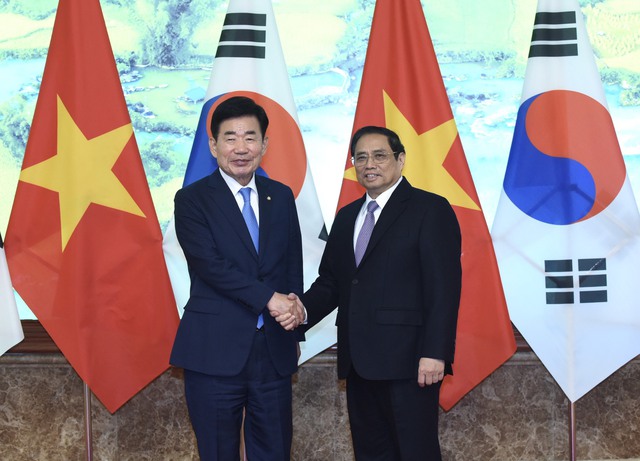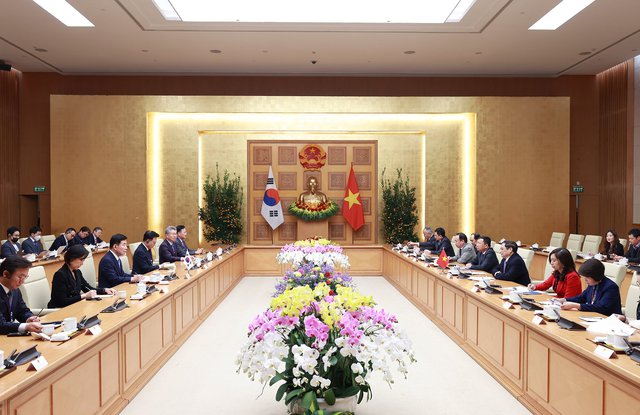Vietnam, S.Korea eye US$100-billion trade turnover in 2023
South Korea is currently the largest foreign investor in Vietnam, with total FDI commitments of $80.5 billion, and the third trade partner with a total turnover of $88 billion in 2022.
Vietnam and South Korea would strive to reach the US$100-billion trade turnover target right in 2023 and $150 billion by 2030.
| Prime Minister Pham Minh Chinh (r)) and Chairman of South Korea’s National Assembly Kim Jin Pyo in Hanoi on Jan 17. Photos: VGP |
The view was shared during a meeting between Prime Minister Pham Minh Chinh and Chairman of South Korea’s National Assembly Kim Jin Pyo on January 17.
According to Chinh, Vietnam remains firm in pursuing an independent and self-reliant foreign policy while promoting multilateralism and being a responsible and credible partner of the international community.
In this regard, Chinh said Vietnam considers South Korea an important and long-term partner for mutual benefits, peace, stability, and prosperity in the region and of the world.
At the meeting, both leaders expressed delight at the strong progress of bilateral relations after 30 years of diplomatic relations.
Amid a rapidly-changing global environment, Vietnam and South Korea continue to bolster ties with high political trust.
South Korea is currently the largest foreign investor in Vietnam, with total FDI commitments of $80.5 billion. The country remained Vietnam’s second-largest partner in cooperation for development and tourism and third in trade, with a total turnover of $88 billion in 2022.
Each country has an estimated 200,000 citizens residing in the other, in addition to 8,000 South Korean companies operating in Vietnam.
Prime Minister Chinh said in 2022, Vietnam has achieved positive socio-economic development results, partly thanks to the support from the international community, including South Korea.
| Overview of the meeting. |
Chairman of the South Korean National Assembly Kim Jin Pyo congratulated Vietnam for its steady economic growth despite the difficult global environment and expected the country to soon achieve upper-middle income status with a modern industrial base by 2030.
Kim thanked the Vietnamese Government for its support to the South Korean business community in Vietnam, especially the two dialogues between the Government and the business community to address their concerns.
Kim called for Vietnam's support for South Korea's bid to host World Expo 2030 in Busan, as well as the creation of favorable conditions for South Korean businesses in the country.
He asked the Vietnamese government to help South Korean banks open branches in Vietnam; allow his country's enterprises to cooperate in rare earth mining; ease conditions for citizens to travel between the two countries; and expand the scale of South Korean educational facilities in Vietnam.
Prime Minister Chinh said economic cooperation continues to be the key pillar in bilateral relations and expected both sides to effectively utilize the Vietnam-South Korean Free Trade Agreement and the Regional Comprehensive Economic Partnership (RCEP).
Chinh stressed the necessity for both sides to ensure sustainability and balanced trade relations, calling for South Korea to further open its market for Vietnam’s farm produce, seafood, and seasonal fruits.
The Government leader welcomed South Korean companies to continue investing in Vietnam, especially in priority fields of hi-tech, innovation, green economy, digitalization, and smart city.
“The Vietnamese Government is willing to address concerns and difficulties of South Korean investors to ensure their long-term success in the country,” he added.
Meanwhile, he expects South Korean companies to strengthen cooperation with their Vietnamese counterparts so that the latter can become more integrated into South Korean value chains and eventually make Vietnam an important part of regional and global production chains.
At the meeting, both sides shared the view on ensuring freedom of navigation on the East Sea, and any territorial dispute should be addressed via peaceful means in line with international laws, including the UN Convention on the Law of the Sea (UNCLOS) 1982.














